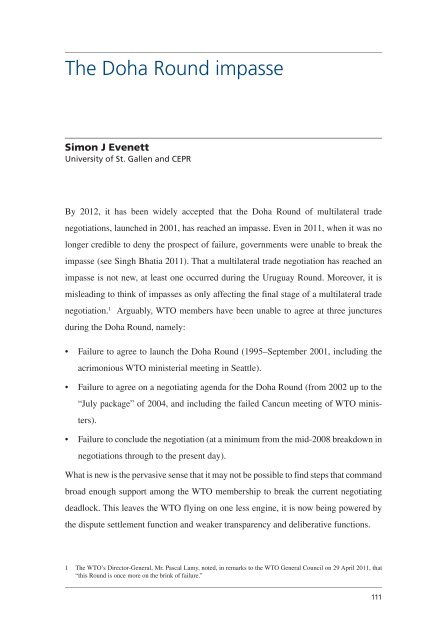Download PDF - Vox
Download PDF - Vox
Download PDF - Vox
- No tags were found...
Create successful ePaper yourself
Turn your PDF publications into a flip-book with our unique Google optimized e-Paper software.
The Doha Round impasseSimon J EvenettUniversity of St. Gallen and CEPRBy 2012, it has been widely accepted that the Doha Round of multilateral tradenegotiations, launched in 2001, has reached an impasse. Even in 2011, when it was nolonger credible to deny the prospect of failure, governments were unable to break theimpasse (see Singh Bhatia 2011). That a multilateral trade negotiation has reached animpasse is not new, at least one occurred during the Uruguay Round. Moreover, it ismisleading to think of impasses as only affecting the final stage of a multilateral tradenegotiation. 1 Arguably, WTO members have been unable to agree at three juncturesduring the Doha Round, namely:• Failure to agree to launch the Doha Round (1995–September 2001, including theacrimonious WTO ministerial meeting in Seattle).• Failure to agree on a negotiating agenda for the Doha Round (from 2002 up to the“July package” of 2004, and including the failed Cancun meeting of WTO ministers).• Failure to conclude the negotiation (at a minimum from the mid-2008 breakdown innegotiations through to the present day).What is new is the pervasive sense that it may not be possible to find steps that commandbroad enough support among the WTO membership to break the current negotiatingdeadlock. This leaves the WTO flying on one less engine, it is now being powered bythe dispute settlement function and weaker transparency and deliberative functions.1 The WTO’s Director-General, Mr. Pascal Lamy, noted, in remarks to the WTO General Council on 29 April 2011, that“this Round is once more on the brink of failure.”111














